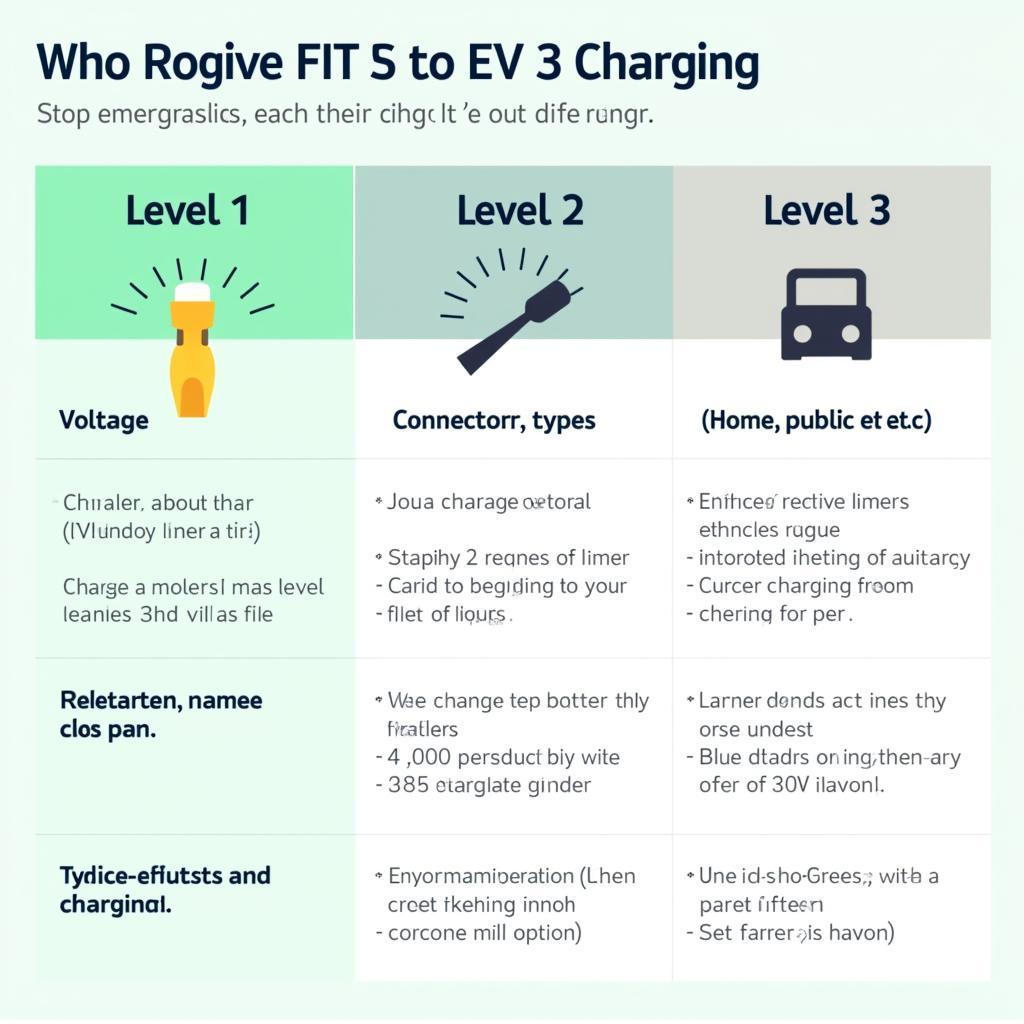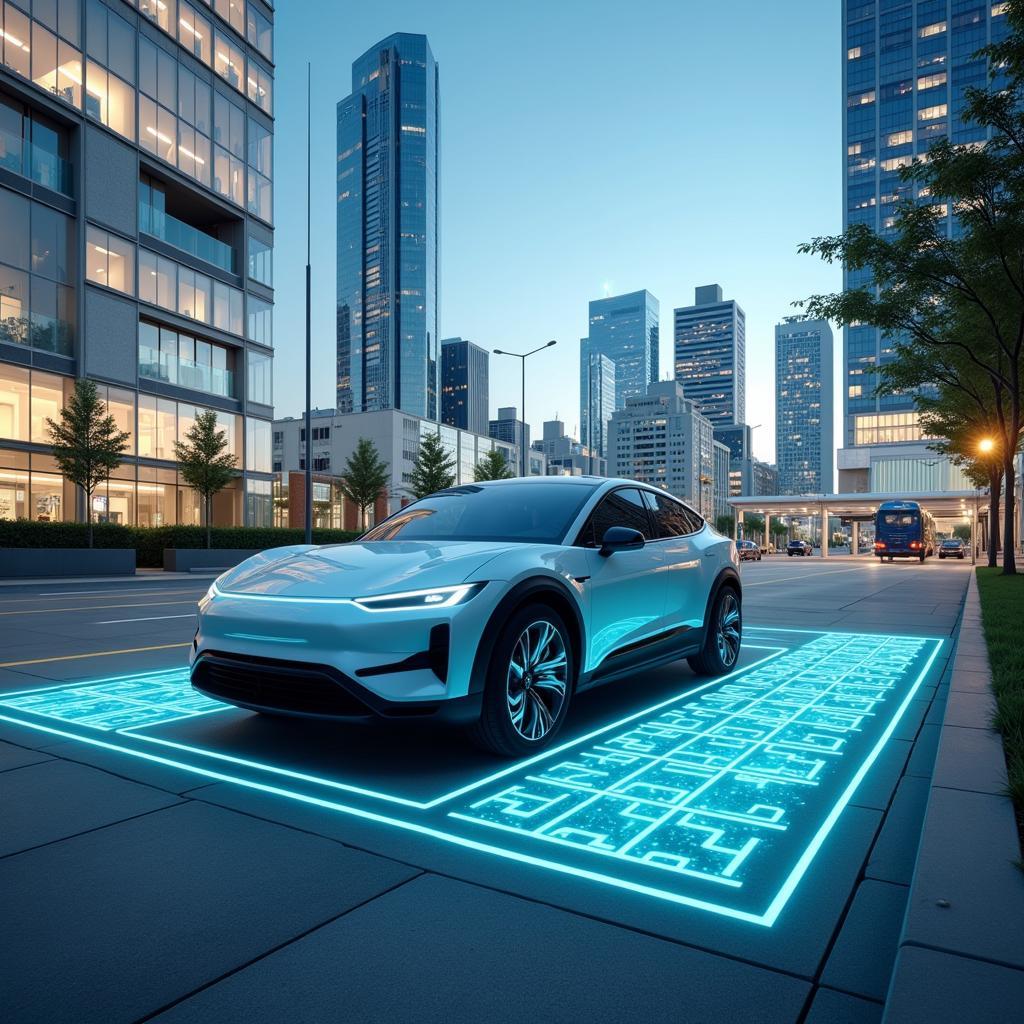Charging electric cars is becoming increasingly commonplace as more and more drivers make the switch to EVs. This guide explores the various aspects of charging electric cars, from different charging levels to locating charging stations and understanding the associated costs. We’ll also dive into future trends in EV charging technology. Find out how to seamlessly integrate charging into your everyday life.
Understanding Electric Car Charging Levels
There are three main levels of charging for electric cars: Level 1, Level 2, and Level 3 (also known as DC fast charging). Each level offers different charging speeds and requires specific equipment.
Level 1 Charging
Level 1 charging uses a standard 120-volt household outlet. This is the slowest charging method, typically adding 2-5 miles of range per hour. It’s a convenient option for overnight charging at home but less practical for quickly topping up your battery.
Level 2 Charging
Level 2 charging requires a 240-volt outlet, similar to what you might use for a clothes dryer. This method is significantly faster than Level 1, delivering 10-60 miles of range per hour. Level 2 chargers are commonly found in homes, workplaces, and public charging stations.
Level 3 Charging (DC Fast Charging)
Level 3 charging, also known as DC fast charging, uses high-powered direct current to rapidly charge an EV battery. It can add up to 200 miles of range in just 30 minutes, making it ideal for long journeys. DC fast chargers are typically found along highways and at dedicated charging stations.
You can find more information on charging stations near you by checking out our guide on charging stations for electric cars near me.
 Level 1, 2, and 3 EV Charging Comparison Chart
Level 1, 2, and 3 EV Charging Comparison Chart
Finding Charging Stations for Your Electric Car
Locating charging stations has become easier than ever, thanks to various apps and online resources. Several dedicated apps and websites allow you to search for charging stations based on your location, connector type, and charging speed. Many navigation systems in electric cars also include built-in charging station finders. Planning ahead for charging stops, especially on long trips, is essential for a smooth and stress-free driving experience.
For more insights into available charging options, take a look at our resource on electric cars charging stations.
The Cost of Charging Electric Cars
The cost of charging an electric car varies depending on several factors, including the electricity rates in your area, the charging level you use, and the size of your EV’s battery. Charging at home is generally more affordable than using public charging stations, especially if you take advantage of off-peak electricity rates. Some public charging stations offer free charging, while others charge by the kilowatt-hour (kWh) or by the minute.
“Understanding your local electricity rates and the pricing models of various charging networks is crucial for managing your charging costs,” advises John Smith, Lead EV Consultant at Green Energy Solutions.
The Future of Charging Electric Cars
The future of charging electric cars is bright, with ongoing advancements in charging technology promising faster charging speeds, increased convenience, and greater accessibility. Wireless charging, battery swapping, and vehicle-to-grid (V2G) technology are just a few of the innovations that could revolutionize the way we power our EVs.
“We’re on the cusp of a new era in EV charging, where charging becomes even more seamless and integrated into our daily lives,” says Jane Doe, Senior Automotive Analyst at Future Mobility Insights. “These advancements will further accelerate the adoption of electric vehicles and contribute to a more sustainable transportation future.”
Check out our insights on future car trends at 2025 hot cars.
Conclusion
Charging electric cars is a key aspect of EV ownership. By understanding the different charging levels, locating charging stations, and managing charging costs, you can enjoy the many benefits of driving an electric vehicle. With continuous advancements in charging technology, the future of charging electric cars looks promising, paving the way for a cleaner and more sustainable transportation landscape.
FAQs
- How long does it take to charge an electric car? The charging time depends on the charging level and the battery size. It can range from a few hours to less than an hour.
- Where can I find charging stations? Charging stations can be found using dedicated apps, websites, and in-car navigation systems.
- What is the cost of charging an electric car? The cost depends on electricity rates, charging level, and battery size.
- What is DC fast charging? DC fast charging is a high-powered method that can rapidly charge an EV battery.
- What is the future of charging electric cars? The future holds innovations like wireless charging and battery swapping.
 Wireless EV Charging Technology Illustration
Wireless EV Charging Technology Illustration
See our other articles about cars on the road and jaguar cars.
Need further assistance with charging your electric car or have more questions? Contact us via WhatsApp: +1(641)206-8880, Email: [email protected], or visit us at 276 Reock St, City of Orange, NJ 07050, United States. Our customer service team is available 24/7.


